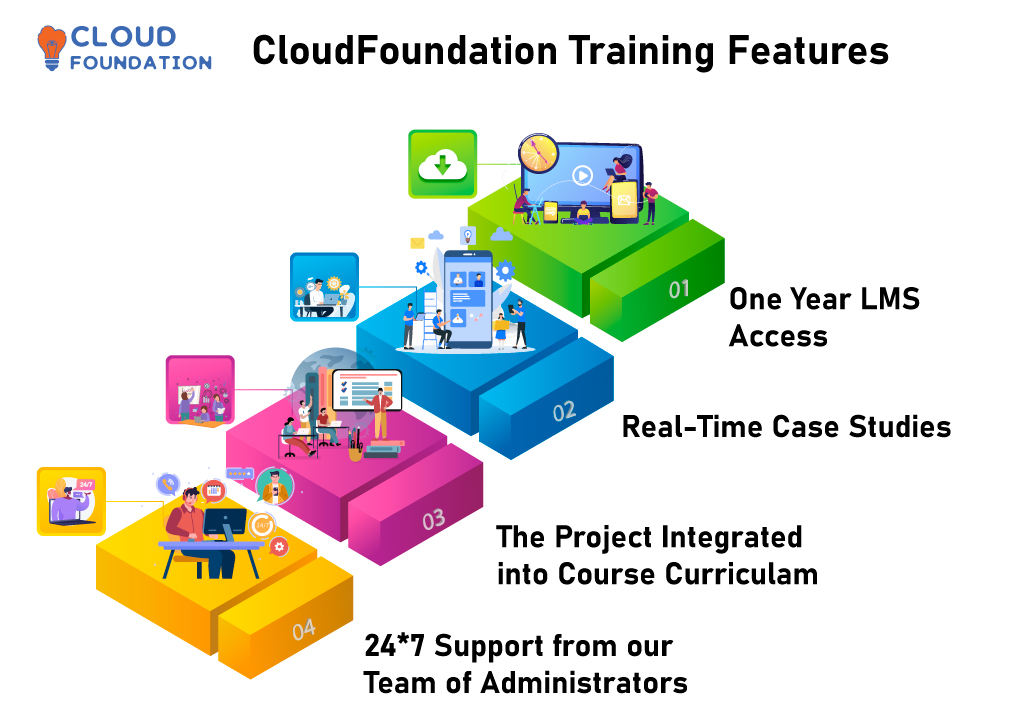Pega Course in Hyderabad | Pega Certification Training
⏰26 hours | ▶️ 28 Videos | 📣 391 Participants | 🔥 228 Reviews
Choose a Plan that Works for You
Self Paced
- Advanced sessions
- Interview Q&A
- Free study Materials
- Premium Technical support
Instructor Led Live Training
- Live Instructor
- Advanced sessions
- Interview Q&A
- Premium Technical Support
Corporate Training
- Live Instructor
- Advanced sessions
- Interview Q&A
- Premium Technical Support
Upcoming Batches PST
| Nov 16 (1 HR A DAY) |
| 07:00 PM PST |
| Enroll Now → |
| Nov 30 (1 HR A DAY) |
| 06:30 PM PST |
| Enroll Now → |
| Nov 27 (1 HR A DAY) |
| 08:30 PM PST |
| Enroll Now → |
Upcoming Batches IST
| Nov 17 (1 HR A DAY) |
| 07:30 AM IST |
| Enroll Now → |
| Dec 01 (1 HR A DAY) |
| 07:00 AM IST |
| Enroll Now → |
| Nov 28 (1 HR A DAY) |
| 09:00 AM IST |
| Enroll Now → |
Course Description
The best Pega Course in Hyderabad can be found at CloudFoundation, where you will receive hands-on instruction from industry experts. On this course, you will gain knowledge in a wide range of topics, including but not limited to: Pega application development, business process management (BPM) principles, data modelling, design rules, and Pega application management. This course will provide you with hands-on experience with Pega using real-world examples from the business world. Throughout the course, you’ll have access to knowledgeable instructors who will provide feedback and advice while also helping you with your projects. By the end of the course, you will also have participated in a series of simulated job interviews and solved periodic homework. You’ll gain a tonne of useful information and experience from these. Therefore, sign up immediately to become Pega certified in Hyderabad.
You may implement enterprise-level solutions for an improved customer experience all the way through with the help of this top-tier business process management software. Possessing Pega skills helps both fresh graduates and seasoned professionals advance in their careers.
PEGA is an industry leading Cloud Based enterprise management platform which is used by companies of all sizes like Walmart, Toyota, and BMW.
PEGA is also one of the cloud platforms in the Gartner 2016 Cloud Infrastructure and Services Market Share Study.
CloudFoundation offer PEGA Online classes which are suitable for both novice and experienced users.
As we all know that PEGA course is very popular in Hyderabad. So here we are providing you information about PEGA Course in Hyderabad.
CloudFoundation offer quality PEGA Training and materials wit world class instructors.
We provide real world exposure and scenarios to help you get a job after completion.
If you are a developer who has some knowledge of PEGA but wants to become an expert and work on PEGA Certification, then this course is for you.
PEGA Certification for Developers is a culmination of theoretical and practical exercises which will help you gain the knowledge required to work on PEGA.
PEGA has a variety of job opportunities available in a range of disciplines from software engineering and solution consulting to sales and marketing.
Positions may be available in the United States, Europe, and various countries around the world.

Course Content
1.PEGA Overview
- PEGA Overview
- PEGA Situational Layer Cake Overview
- How to Use the PEGA Platform
- Studio for application development
- Positions on a PEGA Platform.
2. Introduction to Case Management
- Life cycle of a case
- Designing a Case Life Cycle
- How to Change the Status of a Case
- How to Include Instructions in an Assignment.
3. Service Level Agreements
- What are Service Level Agreements? (SLAs)
- How to Include SLA in an Assignment
- How to Include SLA in a Case
- How to incorporate SLA into the case life cycle.
4. Controlling the Workflow in Case Management
- Optional measures
- How to add optional case into a Case
- Skipping steps and processes
- How to skip a workflow procedure or stage
- Parallel processing
- How to run processes parallelly
- What are Decision points?
- How to incorporate decision points into a process?
5. Routing Work to Users in Case Management
- Introduction to Route work
- How to route a work
- How to set up customized routing
- Case approval settings
- Setup instructions for a single case approval
- How to set up a cascading approval system.
6. Configure a case Hierarchy in Case Management
- Configure a case hierarchy: Overview
- Rules and types of rules
- Rules and rule sets
- Classes and class structure
- How to construct arule
- How to modify a rule
- How to recycle rules through inheritance
- Case ranking
- How to enforce casetype interdependency
- Adding a child case to an existing case.
7. Adding fields to a Case Type in Data Modeling
- An overview of adding fields to a casetype
- Pega application data elements
- How to Manage Properties in data Modelling
- How to Make a Property Reference
- How to define properties
- Define User Views
- Setting up user views.
8. Data in Memory
- Data in Memory: An Overview
- Data storing in memory
- Pyworkpage
- Viewing Clipboard Data
- How to use and change property values with keyboard.
9. Manipulating Case Data in Data Modelling
- Introduction to Setting Values and Automation
- Define Data Transformations
- How to Use Data Transforms to Set Values
- How to Configure Default Property Values
- Data Transformations and Super Classification.
10. Calculating case Values in Data Modeling
- Calculating case values: An Overview
- Define Declarative processing
- What are Declare expressions?
- How to use a declare expression to set a property value
- Forward and backward chaining.
11. Validating Case Data
- Introduction to Case Data Validation
- Methods of validating data
- How to verify case data against controls
- How to validate case data using valid rule validation
- Using a validation rule to verify a flow action rule
- How to use edit validate rules.
12. Using the Integration Designer in Information Exchange
- How to Visualize Data using an Integration Designer.
13. Creating Data Types in Information Exchange
- Processing application data using data types
- How to construct a data type source locally
- Configuration of a data source for an existing data type
- How to create a datatype that is externally sourced.
14. Managing Data Pages and views in Information Exchange
- Data views and Data Pages
- How to access sites with On-Demand Data
- How to configure parameters for data page sourcing
- How to preserve information using a Data Page.
15. USER INTERFACE: Customizing User View Layout
- Configuration overview of a user form
- Section rules
- Guidelines for designing user views
- Configuration of a segment
- How to configure responsive user interface.
16. Adding Dynamic Content to user Views (UI)
- A primer on incorporating dynamic material into user views
- Dynamic UI design
- Configuration of dynamic content
- Event handling
- Configuration of event processing.
17. Styling an Application (UI)
- Styling an application: Overview
- Skin application for styling
- How to alter the appearance of an application using skin
- Skin control over application appearance.
18. Sending Correspondence (Case Management)
- Sending and configuring the correspondence
- Case Communications
- Sending an email from a case
- Configuration of correspondence rules.
19. Creating Business Reports (Reporting)
- Introduction to Business Report Writing
- The Function of Reports
- Business and Operational Report Types
- The Report Browser
- How to Construct a Report
- How to Arrange Report Outcomes
- Developing a Report.
20. Optimizing Report Data (Reporting)
- Data Storage in PEGA Applications
- Property Enhancement
- Property Optimization for Reporting.
21.Unit Testing Rules (Application Development)
- Unit evaluation
- How to test a rule individually
- How to record unit tests for testing automation.
22. Delegating Rules (Application Development)
- Business Rule delegation
- How to delegate rules to an organizational user.
23. Advanced Topics
- Decision Tables and Decision tree types
- Integration(Services and connections)
- Activities
- Application Export/Import
- Packaging
- Establishing product rule
- Post and preliminary processing operations
- Varied forms.
FAQ’s
❓ What is a PEGA Course?
✅ Pega is a Business Process Management (BPM) software platform. Pega courses teach users how to use the software to automate business processes, such as customer service, sales, marketing, and more.
The courses provide an overview of the Pega Platform and its features, as well as hands-on exercises to help users understand how to use the software.
❓ How long will it take to Learn PEGA?
✅ The amount of time it takes to learn PEGA will vary based on your familiarity with programming languages, your level of experience with software development, and how much time you are able to dedicate to learning.
Generally speaking, it could take anywhere from three months to a year to become proficient in PEGA.
❓ Who is Eligible for PEGA?
✅ Pega is open to any individual who is interested in developing and deploying customer engagement and digital process automation applications.
This includes individuals from a variety of backgrounds, such as IT professionals, software developers, business analysts, and even those who are new to the field.
❓ Is PEGA Good for Future?
✅ Yes, Pega is a great choice for the future. It is a powerful and versatile platform that allows companies to build and deploy customer-centric, AI-driven applications quickly and cost-effectively.
Pega’s low-code approach to application development makes it easy to use and customize, and it can be used to build powerful and complex applications for a variety of industries.
❓ What is the Cost of PEGA Certification?
✅ The cost of the Pega certification exams varies based on the type of certification you are looking to take.
However, the average cost of a Pega certification exam is around $200 USD.
❓ Do PEGA have Coding?
✅ Yes, Pega does have coding. Pega uses an object-oriented programming language called PRPC (Pega Rules Process Commander) to design, develop, and maintain its applications.
PRPC is an XML-based language that allows for the development of powerful workflow-driven applications.
Drop US a Query
CloudFoundatǐon CloudFoundatioṋ CloudFoundaṱion CloudFoundåtion
Suggested Courses




Tibco SpotFire Training
⭐⭐⭐⭐⭐
😃 79 Learners




WorkDay Training
⭐⭐⭐⭐⭐
😃 158 Learners




SailPoint Training
⭐⭐⭐⭐⭐
😃 106 Learners




MuleSoft Training
⭐⭐⭐⭐⭐
😃 221 Learners
A few of our students
















Contact Us